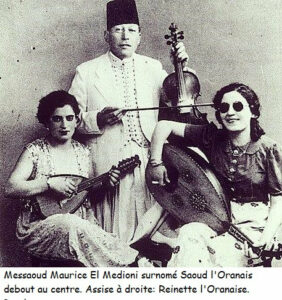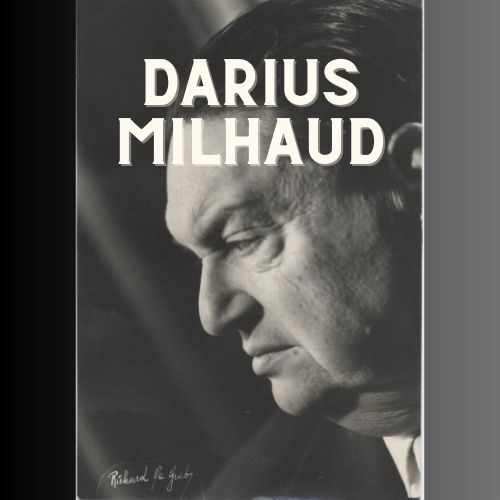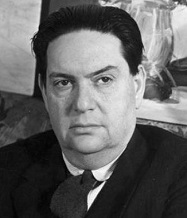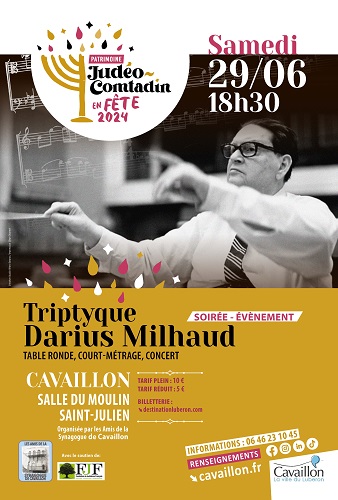
By Hervé Roten
Born on October 18, 1928 in Oran (Algeria), in one of the lively alleys of the derb al yahoud (Jewish quarter), Maurice El Médioni was immersed in oriental café music from his earliest childhood. His uncle, Messaoud Médioni, known as Saoud l’Oranais, ran a café-cabaret where he played violin, composed and sang, and where the singer Sultana Daoud, who later took the pseudonym Reinette l’oranaise, made her debut.
“But music didn’t come to me through him,” Maurice El Médioni would later recount. “My father had died in 1935, when I was 7, and we were four children raised by a mother of meager means. When I was 9, my older brother came back from the flea market with an old piano. It was the happiest day of my life. I loved to sing: Tino Rossi, but also Trenet” (…) “Was the piano difficult? Not at all. “I learned in a week. There was an absolute relationship between my fingers and my brain.” [1]Véronique Mortaigne, “Maurice El Médioni, le piano à l’arabesque”, Le Monde, June 27 2003
As a pianist, Maurice was regularly invited by his school friends to entertain at parties and birthdays. But on November 8, 1942, the Americans landed in North Africa. Gifted with an innate sense for music, improvisation and accompaniment, Maurice, aged just 14, frequented American bars where he was introduced to boogie-woogie and country music alongside African-American and Texan soldiers. He also met Puerto Rican soldiers who taught him the rumba and cha-cha-cha. After the departure of 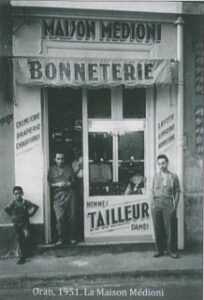
One day, around 1947-48, “I was playing at the Café Salvat. Three North Africans passed by, street musicians with derbouka and tambourine. In the evening, we play together. In a few minutes the bar was packed, Arab music had just blended with jazz and cha-cha-cha!“.[2]Véronique Mortaigne, op. cit.
With his musician friends – Hamida Guerbi, Amar Ben Amar and Kaddouri Bensmir – Maurice entertained at the Café Salvat, which was never empty…” Until one day, when musician Blaoui Houari asked him to join the Oriental orchestra of the Oran Opera directed by Mahieddine Bachtarzi. […] At the head of a musical society, the Moutribia, Bachtarzi multiplied exchanges with other Maghreb countries. As a result, Maurice accompanied many Tunisian artists on tour in Algeria. […] In France, I was good friends with Raoul Journo, but we never played together! All the Tunisian musicians in and around Paris were my friends: El Kahlaoui Tounsi, Maurice Meimoun…”[3]Raoul Bellaïche, “Maurice El Médioni, créateur du ‘pianoriental'” – Interview with Maurice El Médioni, Je chante ! Magazine n° 1, January 2016, p. 61
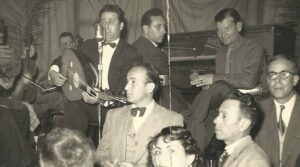
In 1961, Maurice El Médioni left Algeria to emigrate to Israel, where he stayed for a few months before settling in Paris in 1962, where he sometimes played at parties, bar mitzvahs and weddings. In 1967, he decided to return to the Mediterranean sunshine of Marseille, where he opened a clothing store with his brother. Occasionally, at Line Monty‘s express request, he returned to Paris to accompany her on piano.
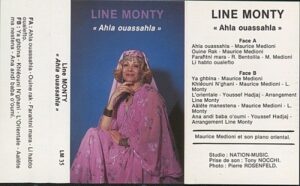
In 1985, he gave up his 42-year career as a tailor to devote himself entirely to music. He performed regularly with Reinette l’Oranaise, Lili Boniche and Blond-Blond, while maintaining close ties with Line Monty.
In the 1990s, Michel Lévy, who had bought the Dounia catalog from El Kahlaoui Tounsi, produced several CDs with Bruno Barre, featuring Lili Boniche, Blond-Blond, Reinette l’Oranaise, Line Monty, Luc Cherki, René Perez… in a collection entitled “Trésors de la chanson judéo-arabe” (Ed. Mélodie Distribution). These CDs, which were later reissued by Buda Musique, brought back into fashion the leading artists of Franco-Arab or Franco-Oriental chanson, sometimes accompanied on piano by Maurice El Médioni or singing his works. In 1992, the opening night of the Montpellier-Danse Festival featured Line Monty, Lili Boniche and Reinette l’Oranaise. Maurice El Médioni’s career took off on stage and in the recording studio. In 1996, the Piranha label released a CD entitled Café Oran – Maurice El Médioni et son PianOriental, on which he played with the Klezmatics. In 2000, he recorded Samaï Andalou – 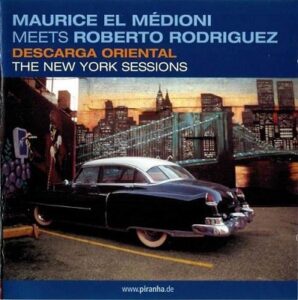
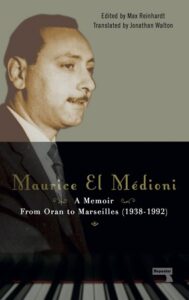
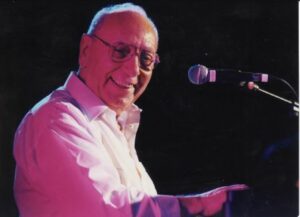
- Consult the Maurice El Médioni archive fonds
- Listen to excerpts from the Oran-Oran CD
- Listen to the playlist Algerian Jewish Song (1)
- Listen to the playlist Algerian Jewish Song (2)
- Buy the comic book and CD Les stars du music’hall d’Algérie by Valérie Cohen and Didier Zuili
| 1 | Véronique Mortaigne, “Maurice El Médioni, le piano à l’arabesque”, Le Monde, June 27 2003 |
|---|---|
| 2 | Véronique Mortaigne, op. cit. |
| 3 | Raoul Bellaïche, “Maurice El Médioni, créateur du ‘pianoriental'” – Interview with Maurice El Médioni, Je chante ! Magazine n° 1, January 2016, p. 61 |
| 4 | See the recording of this ceremony on Akadem |
| 5 | notably to Yvonne Kahan and Ava Bohbot (Chaos Film), who are currently directing a documentary, Notes of Exile, dedicated to Maurice El Médioni. |
